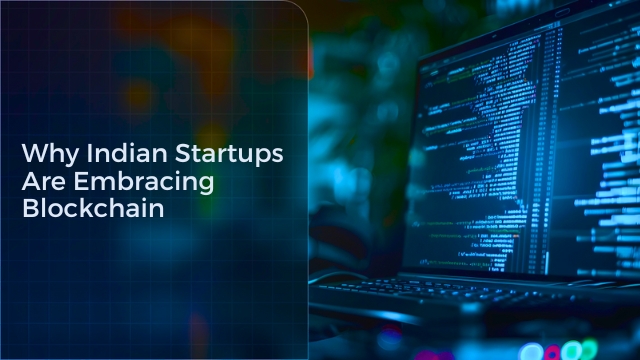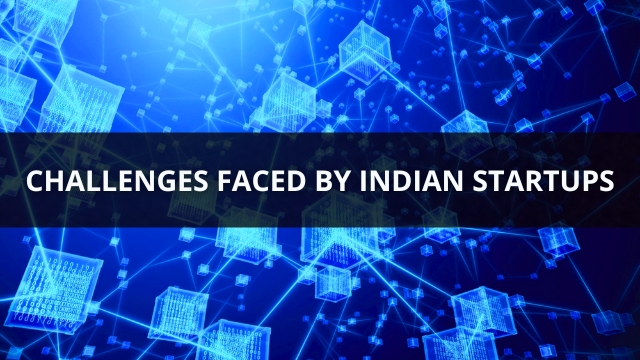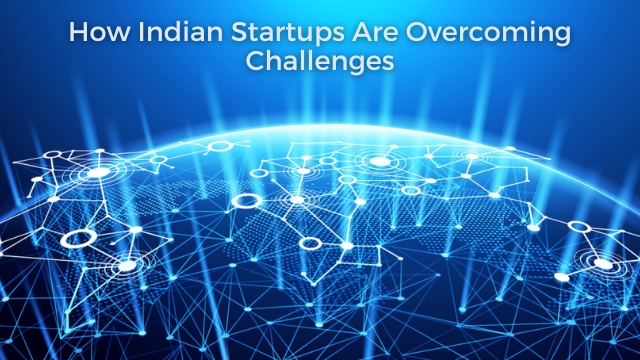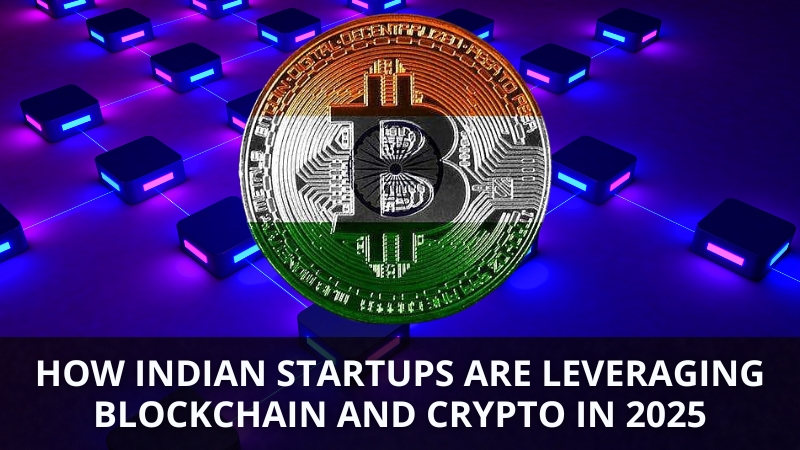India, known for its dynamic and innovative startup ecosystem, has embraced blockchain and cryptocurrency to reshape various industries. In 2025, this adoption is not just a trend but a transformative force that is enhancing transparency, security, and efficiency. Indian startups are leading this revolution, creating solutions that are impacting finance, healthcare, supply chains, and beyond. This article explores how these startups are leveraging blockchain and crypto, the challenges they face, and the opportunities that lie ahead.
Blockchain and Crypto in India’s Startup Ecosystem
Blockchain technology, with its decentralized and immutable nature, is solving long-standing issues of trust and transparency. Cryptocurrency, as a digital asset, is providing new financial opportunities. Together, they are enabling startups to innovate like never before.
Why Indian Startups Are Embracing Blockchain

- Transparency and Security: Blockchain’s immutable ledger ensures data integrity, making transactions secure and transparent.
- Cost Efficiency: By eliminating intermediaries, blockchain reduces transaction costs and increases operational efficiency.
- Trust and Accountability: The decentralized nature of blockchain fosters trust among stakeholders.
- Global Reach: Cryptocurrencies enable borderless transactions, opening up global markets for Indian startups.
Key Sectors Where Indian Startups Are Leveraging Blockchain and Crypto
Finance and FinTech
The financial sector is witnessing a significant shift as startups leverage blockchain to offer faster, more secure, and cost-effective services.
- Decentralized Finance (DeFi): Startups like Polygon and WazirX are leading the DeFi movement in India, providing platforms for peer-to-peer lending, trading, and asset management without intermediaries.
- Cross-Border Payments: Blockchain-powered solutions are reducing the time and cost of international money transfers, benefiting businesses and individuals alike.
- Digital Wallets and Crypto Exchanges: Secure digital wallets and user-friendly crypto exchanges are making cryptocurrencies more accessible to the masses.
Healthcare
Blockchain is enhancing data security and interoperability in the healthcare sector, ensuring better patient care and data management.
- Electronic Health Records (EHR): Startups are using blockchain to create tamper-proof health records that can be securely shared across healthcare providers.
- Supply Chain Transparency: Blockchain is ensuring the authenticity of pharmaceuticals, preventing counterfeit drugs from entering the market.
- Clinical Trials: Transparent and immutable records of clinical trials are increasing trust in medical research.
Supply Chain and Logistics
Supply chains are becoming more transparent and efficient with blockchain technology.
- Traceability and Provenance: Startups are using blockchain to track products from origin to delivery, ensuring authenticity and quality.
- Smart Contracts: Automated smart contracts are streamlining processes and reducing paperwork in supply chains.
- Real-Time Tracking: Blockchain enables real-time tracking of shipments, enhancing logistics efficiency.
Real Estate
Blockchain is bringing transparency and efficiency to the real estate sector, addressing issues of fraud and complex transactions.
- Property Ownership Records: Immutable records of property ownership prevent fraud and simplify title verification.
- Smart Contracts: Automated contracts reduce the need for intermediaries, speeding up property transactions.
- Tokenization of Assets: Real estate tokenization is making property investment more accessible by allowing fractional ownership.
Education
The education sector is using blockchain to enhance transparency and trust in academic credentials.
- Digital Certificates: Blockchain-based certificates are tamper-proof and easily verifiable.
- Student Records: Secure and transparent records of academic achievements ensure the integrity of educational data.
- Decentralized Learning Platforms: Blockchain is enabling decentralized platforms that offer personalized and accessible education.
Government and Public Services
Indian government agencies are exploring blockchain to improve governance and public services.
- Land Records: Blockchain is creating secure and transparent land registries, reducing disputes and corruption.
- Identity Verification: Blockchain-based digital identities are enhancing security and privacy in public services.
- Voting Systems: Secure and transparent voting systems are strengthening democracy.
Challenges Faced by Indian Startups

While the potential of blockchain and crypto is immense, startups face several challenges, including:
- Regulatory Uncertainty: The evolving regulatory landscape in India creates uncertainty for startups.
- Scalability Issues: Blockchain networks must scale to handle large volumes of transactions.
- Public Perception: Misconceptions about cryptocurrencies can hinder adoption.
- Talent Shortage: The demand for blockchain experts exceeds the available talent pool.
Opportunities and Future Prospects
Despite these challenges, the future looks promising for Indian startups leveraging blockchain and crypto. Key opportunities include:
- Government Support: Initiatives like the Digital India program and regulatory sandboxes are fostering innovation.
- Global Collaboration: Indian startups are collaborating with global partners to drive blockchain adoption.
- New Business Models: Blockchain is enabling innovative business models, such as decentralized marketplaces and peer-to-peer platforms.
- Sustainable Development: Blockchain is supporting sustainable practices, such as transparent supply chains and renewable energy tracking.
How Indian Startups Are Overcoming Challenges

Indian startups are finding innovative ways to address these challenges and maximize the benefits of blockchain and crypto. For example:
- Regulatory Compliance: Startups are working closely with regulators to ensure compliance and build trust.
- Scalable Solutions: Advances in blockchain technology, such as layer-2 solutions, are improving scalability.
- Education and Awareness: Initiatives to educate the public about blockchain and crypto are increasing adoption.
- Talent Development: Universities and online platforms are offering blockchain courses to build a skilled workforce.
Conclusion
In 2025, Indian startups are harnessing the power of blockchain and crypto to drive innovation, enhance transparency, and create new opportunities. Despite challenges, their resilience and creativity are paving the way for a future where blockchain and crypto are integral to everyday life. As regulations evolve and technology advances, India’s startups are well-positioned to lead the global blockchain revolution, transforming industries and improving lives.
Frequently Asked Questions About How Indian Startups are Leveraging Blockchain and Crypto in 2025
Q1. What is blockchain and how are Indian startups using it?
Answer: Blockchain is a decentralized ledger that ensures data transparency and security. Indian startups are using it in finance, healthcare, supply chains, and more to enhance efficiency and trust.
Q2. Why are cryptocurrencies important for Indian startups?
Answer: Cryptocurrencies enable secure, borderless transactions, helping startups reach global markets and reduce transaction costs.
Q3. What challenges do Indian startups face with blockchain and crypto?
Answer: Key challenges include regulatory uncertainty, scalability issues, public perception, and a shortage of skilled talent.
Q4. How is the Indian government supporting blockchain adoption?
The Indian government is promoting blockchain through initiatives like Digital India and regulatory sandboxes, encouraging innovation and compliance.
Q5. Which sectors are seeing the most impact from blockchain and crypto in India?
Answer: Finance, healthcare, supply chains, real estate, education, and public services are among the sectors experiencing significant benefits from blockchain and crypto.
Disclaimer:
This blog post is for informational purposes only and does not constitute financial, legal, or investment advice. We do not guarantee accuracy, reliability, or security. Any actions taken based on this content are at your own risk. Always conduct your own research and consult a professional before making decisions.

